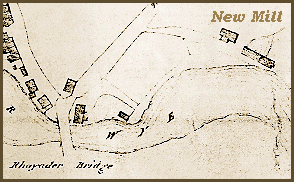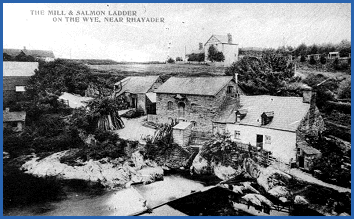
Some watermills of the Rhayader
area
Lower or New Mill 1
For much of its working life this corn mill appeared squeezed in between the railway embankment and the River Wye in the parish of Llansantffraid Cwmdeuddwr.. The mill leat and the brook it is taken from - Nant Gwynllyn - both came under the railway. The mill pond and the troughs feeding the wheels were cut deep into the rock, an enormous task. The origins of the mill are uncertain but there was a mill on the site at the time of the Ordnance Survey surveyor mapped the area for a proposed 2" to the mile map (around 1820).
From the
Ordnance Survey
25" map of 1904
Powys
County Archives
 There
were two mill wheels, one at each end of the mill building. The
northern wheel has six pairs of wooden arms in iron bosses on
a wooden axle, but is much broken and disturbed. It orginally
bore the legend Llanidloes Foundry 1868, indicating the
maker. The southern wheel was later and was about 12ft in diameter
and 4ft wide and its remains are still on site. It was made by
J. Mills of Llanidloes in 1901. The mill building is about 40ft
by 20ft externally. A platform was hewn out of the rock for its
construction so that the back wall upt to above the stone floor
is natural rock. The mill is now derelict and the miller's house
and other outbuildings have gone. The site is overgrown and what
was once the approach road is more like a woodland track
There
were two mill wheels, one at each end of the mill building. The
northern wheel has six pairs of wooden arms in iron bosses on
a wooden axle, but is much broken and disturbed. It orginally
bore the legend Llanidloes Foundry 1868, indicating the
maker. The southern wheel was later and was about 12ft in diameter
and 4ft wide and its remains are still on site. It was made by
J. Mills of Llanidloes in 1901. The mill building is about 40ft
by 20ft externally. A platform was hewn out of the rock for its
construction so that the back wall upt to above the stone floor
is natural rock. The mill is now derelict and the miller's house
and other outbuildings have gone. The site is overgrown and what
was once the approach road is more like a woodland trackImage based on the
tithe map for
Llansantfrraid
Cwmdeuddwr
Powys
County Archives
 This
image from the tithe map of the parish of Llansantffraid Cwmdeuddwr
dates from around 1838 and shows the mill and its pond on the
Cwmdeuddwr bank of the Wye in the days before the railway came
to the Wye valley.
This
image from the tithe map of the parish of Llansantffraid Cwmdeuddwr
dates from around 1838 and shows the mill and its pond on the
Cwmdeuddwr bank of the Wye in the days before the railway came
to the Wye valley.Old postcard
of the mill
By kind permission of Lloyd Lewis

This was the last stage in the development of the mill which was refurbished in the later 19th century. The mill was in use up to the Second World War.